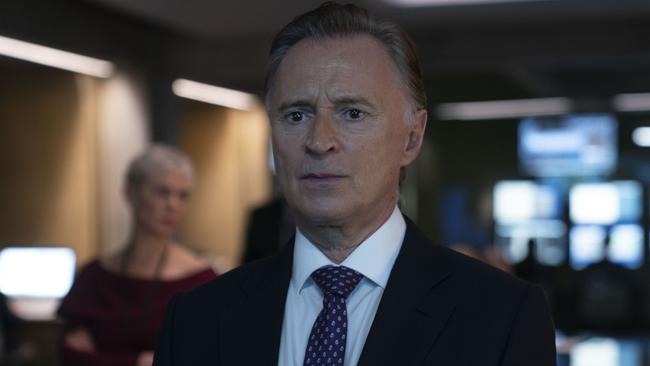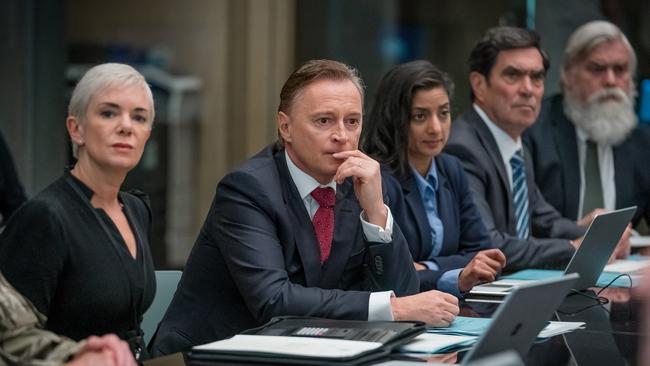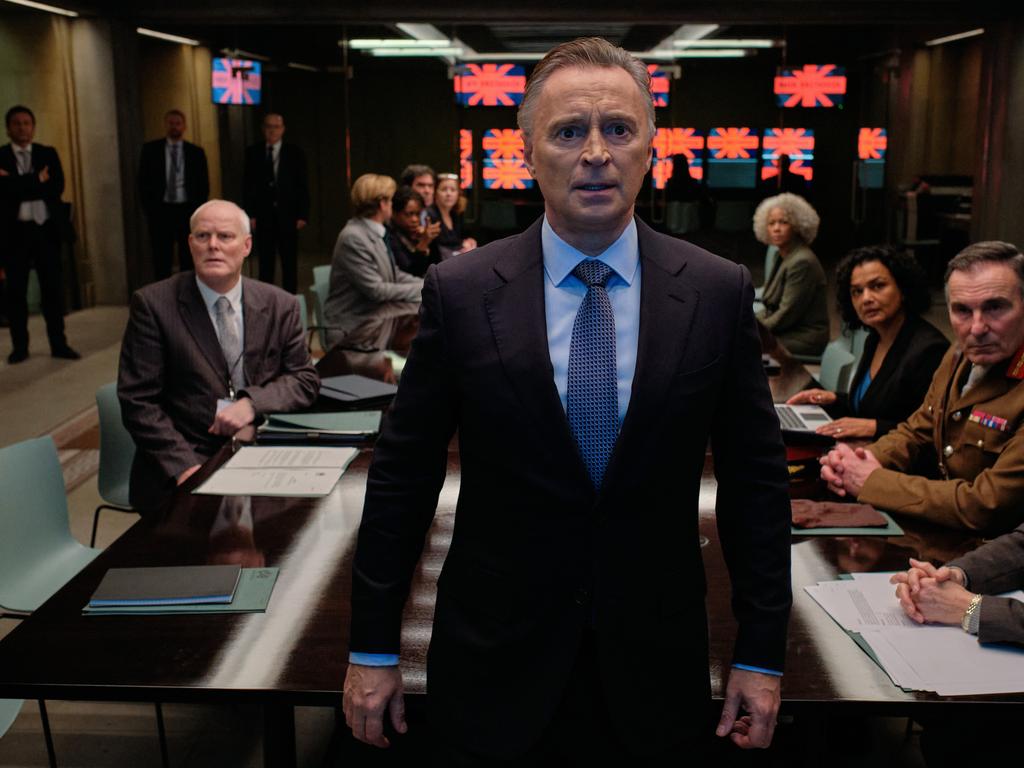Robert Carlyle is back as a PM under siege in Cobra: Rebellion
In its third outing, the British thriller series poses questions about environmental activism and vexed foreign relations.

As the popular British series Cobra entertainingly shows we just love watching stories about the end of the world and, in these technologically sophisticated times, it’s increasingly easy to depict Armageddon in a fashion once unthinkable. As the critic Kate Knibbs says, “At their core, disaster movies provide a vision of comforting destruction, a safe way to imagine the worst.” It’s the same with TV shows.
The thing about disaster stories is that even if the sense of normality is different to what went before we are still reassured by the conventional themes and conventions of perseverance and eventual survival – for some. Then there’s the perverse curiosity with which we watch these stories – just what would we have done in similar emergencies; do we have the moral resolve to survive catastrophe?
Cobra was created by Ben Richards, the lead writer on the slick action series Spooks, keeping Britain from harm with his ambitious plotting and sublime action set piece. But he’s probably better known for the more recent The Tunnel, adapted from the Scandinavian original The Bridge.
Set in the in the Channel Tunnel, a killer nicknamed the “Truth Terrorist” was on a moral crusade to highlight many social problems, terrorising both countries in the process. Richard’s a writer certainty at home with ideas that trade on our fears and how they ask challenging questions about our society.
“It’s as if in crisis we can feel history rolling over us like a gorgeous wave,” the critic David Thompson wrote in Disaster Mon Amour, in which he looks at what lies behind our romance with catastrophe.
“One of the big challenges is finding a big disaster, but not one that gets cleaned up and goes away – it has to have consequences and has to get worse, allowing us to explore the political and social themes as well,” he says of creating the series. “I wanted to examine was what happens when a society loses the shared values and beliefs that should glue it together and, over the period I wrote it, these themes have become part of everyday life.”
The first season of Cobra explored the global consequences and personal complications of a gigantic solar flare which left much of Britain without power, igniting social and political disorder. In the second season, the UK is brought down by a cyber-attack, a new, invisible threat forcing a revaluation with the rest of the world.
In both the political machinations of the Conservative British Government were almost as calamitous as the outside devastations it faced, its fictional Prime Minister under constant threat from his colleagues, those “honourable friends”. The UK is after all a country that thrives on sending unpopular leaders packing as soon as they are deemed more of a liability than asset.
“I love writing about Tory governments and I love watching Tory politics,” Richards says. “Ships can explode, and suns can bombard the earth, but what I’m really interested in is the degree to which you can maintain a coherent society. Writing about maintaining core values under tremendous stress is always the big pleasure.” While Richards is still involved as creator, Toby Finlay (Ripper Street, Peaky Blinders) heads the writing team on the new series, which has a fine feel both for the political and the action drama.
Cobra: Rebellion again features a fine ensemble of those consummate British character actors who not only know how to turn a phrase, but how to fill pauses with meaning, and can adroitly fit into an ensemble without losing their identity. They include Robert Carlyle, Victoria Hamilton, Marsha Thomason and David Haig. Carlyle is again in the centre of the series as Conservative Prime Minister Robert Sutherland, along with the delightful Victoria Hamilton as the Downing Street chief of staff Anna Marshall. She’s returning after recovering from a car bombing in the previous season after the cyber-attack is finally stopped and the US and China have averted a confrontation in the South China Sea.

Again, in the new season, they work intimately together – not easy given the eternal political tensions within the cabinet and certain personal issues that continually emerge. They must not only stop another threat challenging the UK but handle any signs of weakness their political opponents use as an opportunity to attack, or at the very least to charmingly undermine in the best British upper crust fashion.
They’re joined by the returning team of advisers: Haig as Foreign Secretary Archie Glover-Morgan, Richard Pepple’s Home Secretary Joseph Obasi and Marsha Thomason’s Francine Bridge, Shadow Environment Secretary. Joining the cast for this series is the sharp-tongued Jane Horrocks as the populist Defence Secretary Victoria Dalton. And is she a dodgy one.
It is a party, like the Conservatives in the real world, facing a deep sense of disillusionment in the country, all their jobs under real threat.
As the series starts the government is facing demonstrations against its Civil Disturbance Act, having recently enacted tough new laws to restrict the right to protest.
They prevent extremist activists from damaging the economy and disrupting daily life. Protesters are regarded not only as divisive but irrelevant to the autonomy of Britain. “What are they clamouring about today?” mutters the oleaginous and duplicitous Glover-Morgan when caught in a demonstration against an overseas ally suspected of human rights abuses. “The weather, cricket scores, the price of chips?”
It’s quickly shown though that the real threat are militant members of the environmental protest group Planet Resistance, several members of which are occupying a tunnel dug by the movement to disrupt the construction of the detested Metro Ultraline railway network. Taking place on quiet Godley Common, now surrounded by police, it’s estimated by the authorities it will take at least four days to dig them out, though weather conditions are horrific.
Sutherland faces the dilemma of trying to determine just what kinds of suffering are the legitimate cost of the status quo, and is there a limit on how many deaths are too numerous for the UK to countenance?
Cobra, (actually a real place), shorthand for the UK’s government’s Civil Contingencies Committee that is convened to handle matters of national emergency or major disruption, is on constant alert, meeting continuously. Some want to send in the troops, a case, as one suggests, of “sending platoons to the shires”. (In the series it’s a cavernous operational area with a huge polished reflective table for the various argumentative senior cabinet ministers, technical experts, security and military officers and contingency planners chaired by Sutherland. They are surrounded by giant surveillance screens and monitors watching over the unfolding national emergency.)
The plot deepens when it’s revealed to us that the Planet Resistance leader Henry Wicks (Ben Compton) is actually planning something bigger than the occupation, “Something they won’t be able to ignore.” And that Sutherland’s radicalised daughter Ellie (Holly Cattle) has also become involved with the protest, managing to evade her protection officer and heads to Godley Common on the back of a motor bike. Glover-Morgan, of course, is somewhat blasé. “The Trots and hippies are squawking, waving banners and bongos.”
A parallel storyline involves the UK’s valuable ally Shirasia – a fictional Gulf State – significant in terms of both military strategy and potential arms deals. A visit from Shirasia’s young royals causes protests to widen, including a tragic interruption to a horse race they attend. Sutherland’s government desperately needs their country’s investment even though it’s understood to be “a deal with the Devil”.
The acting is pitch perfect. Caryle is again convincing as the beleaguered Sutherland, his marriage in tatters, even though he still makes great family gravy in Downing Street. Hamilton humanises Anna Marshall in a pivotal role, and David Haig again steals the show as Foreign Secretary Archie Glover-Morgan. Horrocks, in fine waspish form as Defence Secretary Victoria Dalton has the best line. Glover-Morgan’s fraudulent smile, she tells him, “Reminds me of my dog when he’s rolled in fox s..t.”
Cobra Rebellion streaming on Binge.





To join the conversation, please log in. Don't have an account? Register
Join the conversation, you are commenting as Logout